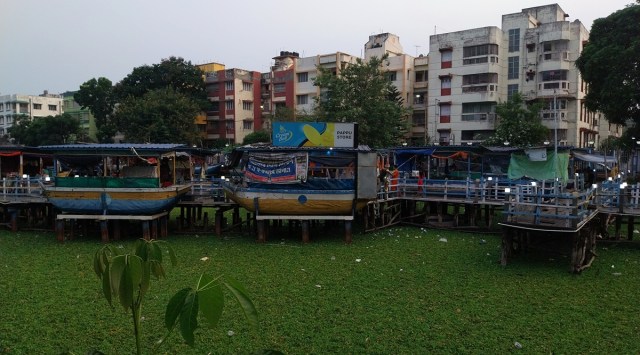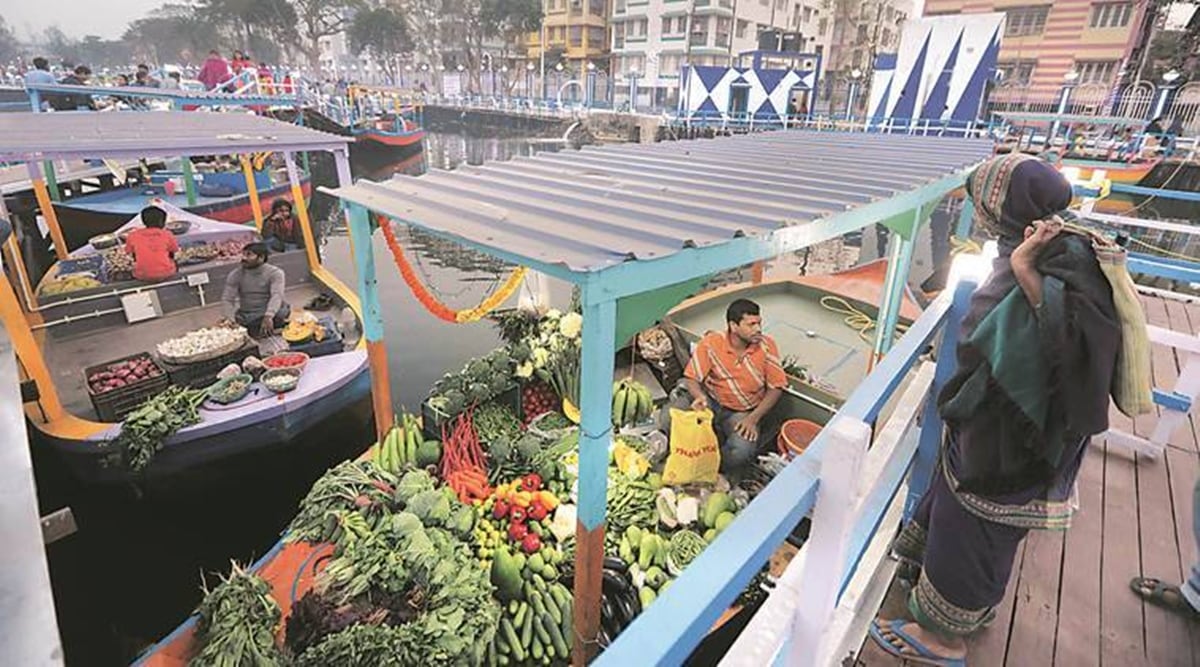Once visitors’ hotspot, Kolkata’s unique floating market is a picture of neglect now
Billed as Chief Minister Mamata Banerjee’s “dream project” that was “inspired” by world-famous floating markets of Thailand, Patuli Floating Market was inaugurated with much fanfare by Firhad Hakim in January 2018.
 Moored boats and the weed-covered canal at Kolkata’s Patuli floating market. (Express Photo)
Moored boats and the weed-covered canal at Kolkata’s Patuli floating market. (Express Photo) On a dimly-lit boat at Patuli Floating Market in Kolkata, the mother-son duo of Bijoy and Manju Majumdar are waiting for customers and hope to sell at least half of the fritters by the end of the evening. With a handful of boats stationed and hardly any people there, it seems an onerous target.
“When the (floating) market opened five years ago, we had booming sales, but now there are hardly any customers,” says Sandhya Halder, who sells tea there.
Billed as Chief Minister Mamata Banerjee’s “dream project” that was “inspired” by world-famous floating markets of Thailand, Patuli Floating Market was inaugurated with much fanfare by Firhad Hakim in January 2018. Now, with boats parked in the around 500-metre-long lake (canal), it looks deserted with decaying infrastructure.
“It was pretty glamorous when it was opened five years ago. The canal had boats floating around and the market was thronged by people from nearby areas. After cyclone Amphan’s impact and the Covid-19 pandemic when public places were shut for nearly a year, the market doesn’t look the way it used to. The boats are now anchored permanently at their specific spots, and the canal is filled with thick weeds. Several shops have shut. The only ones that are there now sell tea, ice cream, phuchkas with some boats selling meat,” says Sougata Roy, a resident of the area.
 Inaugurated in 2008, the Patuli market was “inspired” by the world-famous floating markets of Thailand. (Express Archives)
Inaugurated in 2008, the Patuli market was “inspired” by the world-famous floating markets of Thailand. (Express Archives)
The market, which was supposed to have more than 200 shopkeepers in as many moving boats, now has merely 25, all anchored close by.
“We were relocated to this market when the EM Bypass was being widened by the state government. We did not have to pay anything for it… The market used to have eight security guards and several cleaners who made sure the place was clean and beautifully lit. Slowly, everything stopped and this is the condition now,” Sandhya says hopelessly.
Even Kolkata Mayor and Urban Development Minister Firhad Hakim, who is considered the brain behind the project, admits that the market is “not working”. “For the time being, the (floating) market is not working. We have specific plans for it. We are doing some repair work. We will then start the market again in a new way,” Hakim said when asked about the market.
So, what went wrong?
People attribute the downturn of the market, built at a cost of Rs 10 crore, to cyclone Amphan, which nearly destroyed it in 2020. Even the Rs 3 crore renovation work, post the cyclone, failed to infuse new life into the market.
“If there is no maintenance, then, of course, people will not come. The paths and bridges are in very bad condition. Any mishap can happen at any time. Why would someone want to come to such a risky place? People, especially the elderlies, don’t come now as it does not seem to be safe,” says Lakshmi Bhattacharya, a shopkeeper in the market.
People complained that the washrooms in the market were in a very bad state and the place is not considered safe for women shopkeepers as people who come there to smoke just loiter around.
“Every time we go to the local councillor, we are told that they have no funds for its repair and renovation. Two unions operate here – one the hawkers’ union and the other of the ruling Trinamool Congress. Those shopkeepers who backed the hawkers’ union have left the place and now sell their produce on the street opposite to the market, where they are allotted very little space,” says Bijoy.
However, the shopkeepers who still have stuck with the market, are hopeful of a turnaround – they want to see the floating market regain its glamour, buzzing with visitors as it was once.
— Swastika Chowdhury & Raksha Ray work as interns at the Kolkata office of The Indian Express







